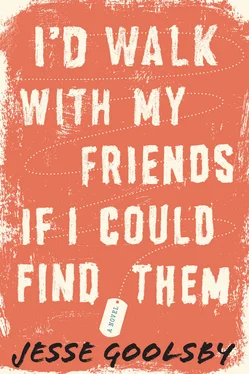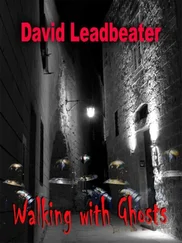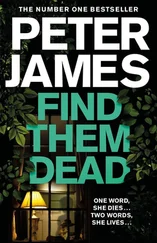The silence lingers so long that Raul asks, “Don’t like fire? Okay. A flood.”
Both quiet, they drive south along Highway 67, and the South Platte River joins them. Fly-fishermen in waders whip their lines out and back. Raul cracks his window and the rushing air smells fresh and warm. They pass through Deckers and keep south toward Pikes Peak, and a few miles farther Raul guides the truck over to a meager turnout and turns off the engine.
“Water,” he says, and points at a humble stream down an embankment. The stream is maybe six feet across and shallow. “Let’s go.”
Raul grabs a backpack and a dusty wool blanket and leads Mia down the gentle slope. They pause on the bank of the stream, and Raul excuses himself and comes back with a boulder that he throws in the middle of the water.
“Step.”
They both cross, and Raul unfurls the blanket on a level patch of ground partially obscured from the road by a stand of flowering reeds. He reaches into the backpack and pulls out a flask and tosses it to her. She unscrews the top and tilts it back and shakes her head.
“Water?” she says, not all that disappointed.
“I have to drive back.”
Raul pats the blanket beside him. A puff of dust rises.
“I don’t feel like sitting,” Mia says, and while she recognizes his intentions, she waits and basks in the high-altitude sun. She stands next to the creek and watches the clear water and smells the pine. She picks up a smooth rock and tosses it into the stream, and the tiny but explosive splash makes her laugh. Raul throws one. He sheds his hunting vest and his black shirt, then puts the vest back on.
“You look ridiculous,” Mia says.
“I do it for attention. It works.”
“Yeah.”
“What do you do for attention?”
“I make out with guys in closets. Then I have my mom come in and beat the shit out of them. It’s a fun routine we’ve perfected.”
They gather large rocks and throw them in, and before long their efforts focus on building a dam across the stream. The lazy project takes fifteen minutes, and near completion, they decide to leave a space where the water runs unimpeded.
“You’ve never asked me about my name,” he says as they sit on the blanket. Mia crosses her legs and touches his arm.
“What about it?”
“It means ‘wolf counsel.’” He growls, claws his left hand, and laughs.
“Who told you that?”
“My parents.”
Mia edges closer and places her hand on his.
“Are you trying to be funny?” she asks.
“Yes.”
“You tell the truth too much.”
Raul reaches for her, and she leans over and kisses him. She feels warm and electric and reaches down to the bottom of her shirt and teasingly lifts it up, then back down. She loves the look in his eyes, mistaking his desire — and her past boyfriends’—for something ineffable and singular in her. Their collective eyes and eager hands convince her that she will never be alone.
While she reaches for the back of Raul’s neck, Mia picks up something in her peripheral vision, a misshapen brown blur through the trees. She stands and brings her index finger to her lips.
“Shhh,” she says, and it comes into focus: a bear, far enough away to excite but close enough to unnerve. “Bear,” and she points.
They gather their things as quietly as possible, tiptoe across their dam, and jump into the Ford. Their anxiety lessens the longer they watch the bear from the cab. They follow the brownish bear as it meanders downstream and disappears.
On the drive back to Castle Rock, dusk settles in and Raul puts on Barbra Streisand. He glances over at Mia, then back to the road. She thinks of saying something but stops herself, because she knows he wants her to comment on the music. Dusk is Mia’s favorite time of day; there is something soothing about the diminishing visuals. She wonders if she will sleep with Raul tonight, if he expects her to.
She watches the darkening road, the double yellow lines curving in parallel, hears the hum of the mud tires, and her mind drifts to her sister walking out of the house that morning, wordless; to her parents — Estes Park, gulping whiskey and wine; to Yellowstone; to the afternoon bear meandering downstream, morphing into two bears. She’s fourteen on a chartered bus in Yellowstone, in a traffic jam in northwestern Wyoming, and her science teacher points at the top of a hill, where two bears feed on a felled bison, and from her bus seat Mia sees the bears, then a flanneled, bearded man with a camera who starts up the hill toward the feeding, and already she senses something is wrong, and her science teacher halts the lecture and yells out the window to the advancing man “Stop!” but the man continues up the hill, so close to the wild that from her vantage point it seems as if he could touch the bears with his hands, and the man stands among the feeding animals and snaps photos, then turns around, walks down the hill, and high-fives his friends before giving the school bus two thumbs up. This, Mia understands — even at fourteen — is exactly the wrong lesson for a bus full of freshmen to learn. Later, on the way back to Colorado, the bus stops unexpectedly in Cheyenne during a manic snowstorm, and after a gripping internal debate she lets Marshall Knicks into her hotel room, and how thrilled and breathless and confused she was when most everything hurt. Then, a week later, swinging back and forth in her snowy neighborhood park, with Camila listening intently to her sex story and nodding along because she understood — how Mia never thought she had to say, “Don’t tell anyone.”
They drive into her dark neighborhood, then down her street. Mia sizes up the Burton home, the house lit perfectly so night passersby can appreciate the trimmed hedges and clean brick. Mia’s home is dark, and as they pull into the driveway she thinks she will invite him in, but she hears herself say, “Thanks, Wolfman. We’ll catch up some other time.”
She smiles.
“’Night,” he says. “Just know you’re breaking my heart.”
“It’s not your heart.”
Alone, Mia turns on the kitchen light and sits on her worn barstool, second from the left. She checks her phone, but there are no messages. She’s tired, and the house is a sauna. When she opens the fridge to cull some leftover mushroom pizza, she spots a sixer of Dogfish, her father’s favorite, but she leaves the beer. She opens the living room windows, plops down, and catches the last half of The Princess Bride.
Surprised that she hasn’t seen Camila, for a moment she doubts her judgment about the Burtons’ being a sanctuary; maybe Camila is wandering the streets right now, lonely and scared, walking in the empty golf course down the road. Mia stares at the Burtons’, at the light reflecting off the silver basement window wells. She’s there. Mia closes her eyes and puts Camila in her parents’ bedroom, betraying her, telling them about Yellowstone, the hotel in Cheyenne, and then she remembers Raul’s suggestion. Not up for a big production, she simply walks to the front door and locks the deadbolt and handle, and does the same to the side and back doors. She closes the windows. A minor deterrence, perhaps, but Camila never has her keys on her.
Mia turns off her phone and turns off the lights. She guesses that Camila will wake her up with some knocking, then pounding, maybe some cursing, and then, sooner or later, she will leave, and they can go at it tomorrow. It may get ugly, and maybe it should.
Years later Mia will regret none of this. Not locking the doors and windows nor the vicious fistfight she’ll win the following morning. She will not regret leaving home halfway through her senior year to live with soft-spoken Aunt Kathy in Aztec, New Mexico, or having a daughter at eighteen — she knew it would be a girl — or raising the child on her own, telling her daughter everything she promised herself she would. In fact, most days she will wish she had burned down the house that night, or at least threatened the fire. Her parents will continue to lose themselves in the bottles they move from the kitchen cabinets and scatter about the house — beneath their bed, in the bathroom vanity, the glove compartment, boxes of Christmas decorations, the outdoor grill. They will not call or write after Mia’s daughter is born. After a year working checkout at the local CVS, Camila will skip the army and join the air force, hoping for desk job but receiving a wrench-turning gig on helicopters, and she will carry the cheek scar Mia gouges into her skin during the morning tussle after the lockout. Six months after the birth of her daughter, Mia will move, because her aunt’s new boyfriend pushes Kathy around the house on paydays. When Mia sends an urgent letter, then dials a desperate midnight call from Shiprock asking for money for herself and her infant child, for rent, for clothes, for anything, Camila will say that she has none to give. Mia will plead, and Camila will ask if Mia is proud of her choices. Camila will ask if Mia has called their parents. Camila will ask if Mia has gone to a homeless shelter, and when Mia says no, Camila will say, “You’re not desperate enough,” and hang up.
Читать дальше












